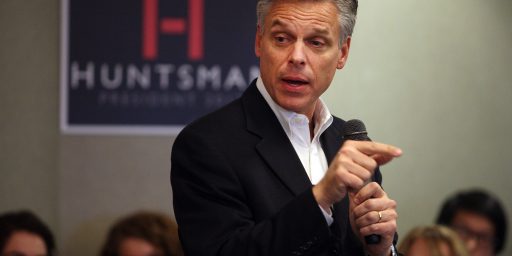Where Huntsman Went Wrong
Huntsman's tactics reinforced his fellow Republicans' natural skepticism of his candidacy.
 While I generally agree with Doug below that Jon Huntsman’s departure from the presidential contest removes one of the more capable and qualified candidates to potentially replace Barack Obama, nonetheless I do have to object to the idea that Huntsman’s choice to serve in a Democratic administration ought to be uncritically accepted by his fellow Republicans.
While I generally agree with Doug below that Jon Huntsman’s departure from the presidential contest removes one of the more capable and qualified candidates to potentially replace Barack Obama, nonetheless I do have to object to the idea that Huntsman’s choice to serve in a Democratic administration ought to be uncritically accepted by his fellow Republicans.
Doug and others have noted myriad examples of Republicans and Democrats alike who have served in the administrations of the other major party; however, what most have failed to note is that in virtually all of these cases, the person in question did so at the conclusion of their partisan political careers. Huntsman’s choice to return to partisan politics after serving as part of an administration, on the other hand, is relatively unprecedented—and to run against the president who appointed him is almost unheard of. The one prominent Republican who attempted such a feat, Wendell Wilkie, suffered a rather ignominious fate in the 1944 Republican primaries that reminds one of Huntsman’s current national polling numbers quite eerily.
One might reasonably argue that Huntsman was only serving his country, rather than the administration of the day, but the charge of an ambassador (like that of a cabinet secretary, but in contrast to the role of a military officer or enlistee) is primarily to represent the administration’s political positions, to the extent that any departure from the administration’s stated policies is grounds for immediate dismissal.
In this regard, Huntsman’s duty as ambassador was first and foremost to advance the foreign policy agenda of the Obama administration, even in circumstances where fellow Republicans (or even he) might reasonably argue the administration’s position was incorrect. This is most notable in the stance to take in enlisting the aid of China in containing the nuclear ambitions of its client state North Korea and other countries where it has substantial influence and ties such as Pakistan. More broadly, an ambassador represents the government of the day on all issues, large and small; thus, to serve as an ambassador, one has three choices: agree with all of those positions; disagree with some but not air those disagreements; or decide that the depth of their disagreement is so profound that they cannot faithfully serve in the position.
Given the length of Huntsman’s service, and given that he has not taken the position that he resigned because he could not faithfully represent the president’s policies to China, his fellow Republicans might reasonably be skeptical of his partisan and conservative bona fides. That skepticism was unlikely to be dampened by Huntsman’s statements on global warming and evolution. Regardless of their veracity, many in the Republican base might reasonably have viewed these statements as needlessly antagonistic or an effort to shore up support from the establishment media as the “reasonable alternative” to the other candidates. That Huntsman gained the endorsements of liberal-leaning editorial boards, at least in part on the basis of those statements, lends some credence to the idea that he was more interested in appeasing the “liberal media” than his fellow Republicans.
All of this is not to say that it is right that Republicans rejected Huntsman’s candidacy. If the American political culture historically had more of a tradition of cross-partisan coalitions in the cabinet and ambassadorial corps, perhaps some of the initial skepticism of Huntsman’s bona fides would have been dulled, but the reality is that most of these cross-partisan appointments (with the notable recent exception of Obama’s retention of former secretary of defense Robert Gates from the Bush 43 administration) have been to rather dull, generally apolitical positions that primarily exist to ladle out pork, most notably the Department of Transportation.
However, Huntsman also made tactical mistakes that reinforced the critique, particularly by seemingly going out of his way to criticize the views of his party’s base. For example, he might have argued that regardless of whether global warming is human-caused, or even if it isn’t, that the U.S. needs to cooperate with other countries lest they use global warming as an excuse to erect non-tariff barriers against American companies like the recent imposition of Europe’s emissions trading scheme (a cap-and-trade system that has been beset with serious technical and political problems since its creation) on U.S. air carriers.
Similarly, while the scientific evidence for evolution is irrefutable (and the competing “theories” of young Earth creationism and intelligent design are non-falsifiable, and thus inherently unscientific), nonetheless it is difficult to identify what part of the president’s job requires him to make pronouncements on the veracity of it or what policy consequences there would be of such statements at the federal level (given that school curricula are properly the responsibility of the states). He also failed to secure sufficient financial and political backing for a successful campaign, instead jumping in late like the similarly ill-fated Rick Perry; had he not taken the ambassadorial appointment, in addition to no longer being handicapped by association with the incumbent president, he would have been freer to secure the backing he needed to be a serious contender.
Like Doug, in my case Huntsman was never my first choice, at least while Gary Johnson remained in the contest (and, given that both of us now reside in Virginia, our upcoming choice is rather circumscribed anyway). That said Huntsman seemed to be an honorable man, and the Republican field is worse off for his impending departure from it, but frankly his campaign and the candidate should take their shares of the blame for the campaign’s inability to gain any traction with Republican primary voters and caucus-goers.






He was smart in a party that prefers stupid.
He was rational in a party that prefers rage.
He was patriotic in a party that cares only for power.
So what exactly is the Republican critique of the Obama policy toward China? Do they think it unwise to pressure China to do what it can to reign in North Korea?
If any of the Republicans had advanced an actual argument about how Huntsman had harmed the country by advancing a flawed foreign policy, then we could have listened to that argument respectfully. But there has been no such critique. The crime was to have served at all, and that is not something that I think a crime.
@Tano: The administration’s failure to get China to scrap the artificial peg of the renminbi to the dollar would be one serious critique. And China certainly could lean far harder on the North than it does, rather than enabling the Kim hereditary kleptocracy, but they don’t want to deal with the refugees who’d inevitably flow north if they got serious with the Koreans.
@Chris Lawrence:
And then the Obama administration could ask China for unicorns.
@Chris Lawrence:
Once again, the GOP proves incapable of understanding the philosophical underpinings for its own supposed positions. In this case, free trade. If the peg is in fact artificial, then the only way it can maintained is by transferring ever greater amounts of Chinese wealth to the United States. This cannot be maintained indefinitely, and whenever it finally collapse, China sees its buying power evaporate overnight, while the US still has all their stuff.
And then even if you think we should get China to drop the peg, there’s no way we can make them. You have to be amazed by the sheer level of delusion in GOP foreign policy lately (doubly amazing in that this once was a party that prided itself on its pragmatism in this area), where they seem to think they have to demand things of other countries, and they will go along with because a Republican President is so awesome that none my resist his will.
You yourself point out why China has absolutely no interest in doing this. Again, do you seriously think a Republican president would have any more success convincing China to shoot themselves in the foot?
>what most have failed to note is that in virtually all of these cases, the person in question did so at the conclusion of their partisan political careers.
Not true about Eisenhower. Not only did his partisan career begin after leaving the Truman Administration, it was the first time anyone even knew what his partisan preferences were.
I don’t think Ike served in the Truman administration, there were hard feelings between them. After he left office, Truman was not an invited guest at the White House until the Kennedy was in office.
@Stormy Dragon:
The party of once steely-eyed realists has become the party of starry-eyed idealists. Wishes don’t make ponies.
At one time in my life I tried to balance my vote and do my part to see that a correct balance between pragmatism and idealism was maintained. I even semi-leaned Republican. I no longer even try – the Republicans have become a party not worthy of my vote. They’ve become self-delusioned radical idealists of the worst sort.
I would challenge folks like James Joyner to elucidate why they still, to this day, support the Republicans with their reluctant vote. Foreign policy, domestic policy, fiscal policy, social policy? What is it?
They are clearly off the rails. The Democrats are the de facto conservatives at this point.
Jon Huntsman’s problem was the people who praised him the most like some of posters here would never, ever vote for him in a general election. He is the best example of the Democratic-Lite idea for the Republican Party. If a candidate is not doing to distinguish himself from the other party, then what is the point of supporting him.
When the biggest fan in the MSM for a Republican candidate is Mika Brzezinski, it should be apparent that the candidate is in the wrong party. Maybe Huntsman should run in the Democratic Party primary in 2016 as the moderate alternative to Andrew Cuomo.
Why Huntsman had to drop out:
To a Friend Whose Work Has Come to Nothing
BY WILLIAM BUTLER YEATS
Now all the truth is out,
Be secret and take defeat
From any brazen throat,
For how can you compete,
Being honor bred, with one
Who were it proved he lies
Were neither shamed in his own
Nor in his neighbors’ eyes;
…
@superdestroyer:
I would vote for Huntsman in a second.
My problem with voting for Huntsman is that he belongs to a party that no longer advances my policy goals.
I view anyone who identifies himself/herself as Republican with major distrust. You don’t have to abandon the party to get my vote, but you do have to disavow all of the obstructionist silliness, the Gingrichian bomb-throwing tactics over strategy, and the flat-out anti-Americanism embodied in the hope and desire that the current President fail so that the Party can succeed.
Besides, Obama is basically a Republican circa 1991 so voting for him is a no-brainer.
I would give Huntsman a serious look (although his potential Supreme Court nominees might be the decisive factor against him) but the current Republican party would never, ever actually nominate him for the Presidency given their current “policy” predilections.
The party has lost its way. It is no longer conservative, but authoritarian, right-wing, and reflexively against whatever the opposition is for regardless of the merits.
That’s my beef with Huntsman.
But it’s not all on him. What will it take to snap these idiots out of their fever dream?
@Chris Lawrence:
That strikes me as a wish-list, Chris.
If the GOP faults Dems for not getting China to do everything good for America … it doesn’t exactly show intellectual depth.
@michael reynolds:
Ah yes, my reaction exactly.
@superdestroyer:
I think the people who praised him most were James and Doug, and yes I think they’d choose Jon over Barack.
Related, the impact of specifically China on the US economy is probably less than we tend to think.
@de stijl:
Anyone who says that the Democrats of today are the same as the Republicans of 1991 is a fool. The Democrats of today are closer to the Nixonian Republicans of 1971. Anyone who says that President Obama is the samw as President BUsh I was not around in 1991.
@superdestroeyr:
Point taken. I agree.
Today’s D’s are more like Nixon-era R’s than circa 1991 R’s. In 1971 Republicans still used to believe in things like science and mitigating the negative effects of humans on the planet.
Who’s Jon Huntsman?
Seriously, unless you hang out in the weeds of party politics, he was an unknown fresh back from China where he was Obama’s direct representative. That’s a big hurdle to get over. Without a name, he needed to be in country making a reputation in domestic politics.
Add in his shining moment was when he took the slogan ‘You dumba–es should vote for me’
Again, if you are unknown, you can’t run about looking, talking, acting like the other side.
@de stijl:
The Republicans of 1971 believed in wage and price controls, central economic planning, and social engineering. The Republicans of 1971 also have little ability to think about the long term consequences of their decisions. See how bad the quality of life was in 1980.
And there is no science to off-sets in the CWA and CAA. It is purely an economic decisions. so much for science.
@superdestroeyr:
BTW, you may want to check the spelling of your name.
But your point of 1971 vs. 1991 Republicanism is a distraction.
The problem is with the current day Republican party.
@de stijl:
The problems with the current day Republicans is that they are irrelevant to politics, governance, or policy in the U.S.
No amount of policy changes or finding “good” candidates is doing to change that.
Look at how unsuccessful Huntsman was as a “Democratic-lite” candidate. The few remaining Republicans had no use for him and there is no core groups in the Democratic Party that would ever vote for him.
Huntsman reminds me of the rich kid in high school who will do anything to be accepted by the “cool” kids. In politics today, the elite, white progressives are the “cool” kids and they are no doing to share power with anyone else.
@superdestroyer:
This is the exact reason I can no longer vote R. The quality of life in 1980 rocked. But because Carter was President apparently, life sucked. It didn’t.
And where life did suck, it was not Carter’s fault unless you believe that a President has absolute power over the entire globe and time itself.
Again, you are trying to distract us from the real problem. The salient issue is not 1971, 1980, nor 1991.
The problem is today. The problem is today’s Republican party and it’s unwillingness to engage with today’s issues.
We have a major party that will get 45-55% of the vote in the next presidential election yet it refuses to act responsibly.
America is a superpower. Acting irresponsibly is not that huge of a deal if we were a backwater nothing of a country, but we are not.
We are 2012 America with all that implies.
Hosting a parasite major party hurts us – immensely.
@JKB:
You seem to agree that Huntsman over estimated his audience.
He now knows he should have played dumber himself in the early rounds … said “I’m glad I’m out of that socialist hothouse” or something.
@john personna:
He didn’t over estimate is audience, he over-estimated his ability to offer a cogent argument supporting his views. So instead he insulted his audience.
“I’m glad I’m out of that socialist hothouse”
Are you talking about the Obama administration? If so, then yes, he should have said that then laid out examples he saw while serving as part of the administration.
I completely agree with this analysis; running for President within a party system requires one to first gain support within the party. I think people who identify as non-partisan tend to be oblivious to the nature of the system.
For example, Huntsman failed to get on the ballot in Illinois, where other, even less-organized candidates will appear. Why? Well some of the other candidates, like Romney, have a substantial campaign organization present in every state. Other’s like Santorum, don’t have such an organization, but they have formed alliances with prominent state politicians who are familiar with local rules and will get signatures. These alliances form through a history of mutual support (Santorum campaigned for semi-prominent Republican Salvi, who gathered the signatures for him) I guess a third approach is to buy the signatures, but the track record of this working seems very mixed.
@anjin-san:” I don’t think Ike served in the Truman administration”
I personally don’t see military service as being part of an administration either; I think we expect military personnel to honor their commitment to the service regardless of the identity of the civilian administration in charge. And it doesn’t help that many of the lesser ambassadorships appear to be given out in exchange for political support.
But if we are down to Eisenhower as the exception, it would only suggest to me that someone of Eisenhower’s stature is going to be able to pull this off.
@JKB:
But that’s the rub. What he saw was a moderate, pragmatic, engagement with China. He’d have to play stupid and belligerent (“War!”) to satisfy the base.
Even if he was honest and sane, and said “China policy wasn’t so bad, but on domestic …” he’d already be on the wrong foot. Why?
Republicans in the primaries don’t want to be real about China (or much of anything else. 9-9-9.
Geez Louise, if you want to put this ALL on Huntsman for running an imperfect or ill-prepared campaign, I have two words for you: Herman Cain.
He grabbed the top of the polls running on crazy. That is the group you are faulting Jon for not reaching with better (but non-crazy) messaging.
Because Huntsman represents what Repblicans should want in a Presidential candidate rather than what they actually want, he would have had to run an almost perfect campaign to replace Mitt Romney as the establishment frontrunner. And he didn’t. He wasn’t strong enough where he needed to be strong, or subtle enough when he needed to be subtle, or human and approachable enough.
It strikes me as a political tragedy of our times that the best politically conservative candidates don’t even make the ballot or debates, or struggle along like Huntsman at the bottom of the popularity of the candidate group. This is what the disease of politically pursued social conservatism has wrought upon our body politic.
@Alanmt:
Do you really mean that Huntsman is the type of Republican that most Democrats want the Repubicans to be: no questioning of the Democrats POV, no questioning the Democrats on what important issue are today, no questioning of the direction that the country is doing.
The only Republicans who would want someone like Huntsman are the Deocratic-lite types who really want to be Democrats.
The real question is why was Huntsman running in the Republican Primary when he agrees with the Democrats on most issues and was just willing to argue about price.
@superdestroyer:
Aren’t you falling victim to this?
Where did he go wrong – Country before party? Rational thought process? Facts over dogma?
It’s a long list…
Sadly, that person does not exist.
@john personna:
Seriously. A lot of moderates & liberals decided they “liked” Huntsman basically because he wasn’t overtly hostile. But his actual policies (past and presently espoused): boilerplate GOP-style Conservatism. And, whenever a liberal writer actually looked at his preferred policies, he/she didn’t like what she saw.
He’s got a temperament right for a moderate from either party. He has boilerplate GOP/Conservative policies.
The GOP wants a “fighter” and he’s not that.
@Rob in CT:
I do not believe that open borders, unlimited immigration amnesty for illegal immigrants is boiler plate conservatives. I do not believe regulating greenhouse gases to the level required to meet international requirements is boilerplate conservative.
Huntsman, other than wanting to exchange lower tax rates for eliminating tax write offs, has little to offer conservatives. It was also hard to pin down his foreign policy positions. One minute he sounded like a Paleoconservative and the next minute he sounded like GW Bush.
@superdestroyer:
Dude, you have one crazy and arbitrary definition of “open borders.”
I doubt you even got the word “unlimited” right.
I’m also unaware that Huntsman was in the “regulate greenhouse gases to the level required to meet international requirements” camp. I might have missed that, I admit.
It’s one thing to say “yeah, it sure looks like AGW is real” and it’s another to say “welp, that means we gotta enact XYZ regulations. He could take (defensible, IMO) position that we should negotiate a treaty with the other big emitters but, in the absense of such a treaty, we refuse to shoot ourselves in the foot economically.
Recognizing the problem does not automatically mean you favor a particular solution.
@john personna:
If anyone who makes it across the borders get to stay unless they commit multiple felonies, the the U.S. has open borders. The question to ask Huntsman is if there is anybody he would support the deportation of and is there anybody who he would bother to keep from entering the U.S., stealing an identity, and working off the books?